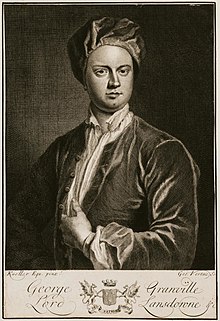George Granville
|
The Right Honourable The Lord Lansdowne PC |
|
|---|---|

George Granville, 1st Baron Lansdowne
|
|
| Secretary at War | |
|
In office 1710–1712 |
|
| Preceded by | Robert Walpole |
| Succeeded by | Sir William Wyndham |
| Personal details | |
| Born |
Birdcage Walk, London 9 March 1666 |
| Died | 29 January 1735 (aged 68) Hanover Square, London |
| Nationality | British |
| Spouse(s) | Mary Villiers (m. 1711–35) |
| Parents |
|
| Alma mater | Trinity College, Cambridge |
George Granville, 1st Baron Lansdowne PC (9 March 1666 – 29 January 1735) was an English poet, playwright, and politician who served as a Privy Counsellor from 1712.
Granville was the son of Bernard Granville, the fourth son of Sir Bevil Grenville (1596-1643) of Bideford in Devon and Stowe in the parish of Kilkhampton in Cornwall, a heroic Royalist commander in the Civil War. (The family changed the spelling of its name in 1661 from "Grenville" to "Granville", following the grant of the titles Baron Granville and Earl of Bath). His uncle was John Granville, 1st Earl of Bath (1628-1701) whose half-first-cousin was George Monck, 1st Duke of Albemarle, who both played leading roles in the Restoration of the Monarchy to King Charles II in 1660. He was heir male of William Henry Granville, 3rd Earl of Bath (1692-1711), the 19-year-old son of his first cousin Charles Granville, 2nd Earl of Bath (1661–1701), lord of the manors of Bideford in Devon and of Stowe, Kilkhampton, Cornwall. These connections guaranteed that Granville began life as a staunch Tory and Jacobite.
His early interests were as much literary as political. He entered Trinity College, Cambridge in 1677. Among his productions while there were poems welcoming Mary of Modena when she visited the university. He spent time in Paris and after the Glorious Revolution of 1688, which brought down the Jacobites, he lived for a while in retirement in England. By the mid-1690s he had befriended John Dryden and begun to write plays. He wrote an undistinguished comedy of manners entitled The She Gallants, which was staged unsuccessfully in 1695. His adult plays bear the marks of Dryden's influence. The Heroick Love is taken from the first book of Homer's Iliad. Granville also followed Dryden in adapting Shakespeare and Granville's The Jew of Venice (1701) was a successful updating of The Merchant of Venice. Perhaps his greatest success was The British Enchanters (1705), a pseudo-operatic extravaganza staged by Thomas Betterton's company.
...
Wikipedia
